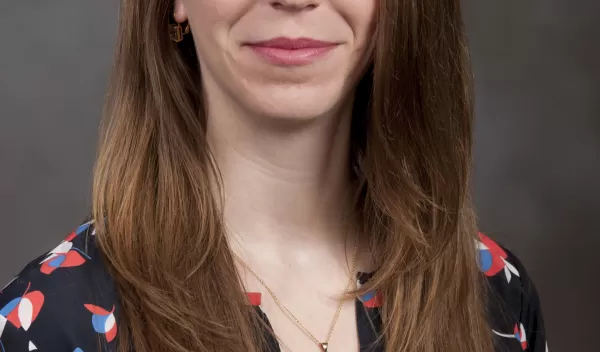
Research aimed at improving the college experience for diverse students
Many programs aimed at getting students ready for the rigors of college teach study habits and note-taking skills--even how to write an email to a professor. But they often don't prepare students for the kinds of challenges that arise from the campus atmosphere itself.
"If you don't make changes to the field, to the environment of a college, then you are addressing only half of the problem," says Sarah Ovink. "Very often, colleges aren't fully attuned to the needs of diverse students, including how a student is--or isn't--accepted into the environment."
Ovink, an assistant professor of sociology at the Virginia Polytechnic Institute and State University (Virginia Tech), wants to know more about the more subtle--but no less serious--problems that confront college students, specifically those resulting from inequalities related to gender/race ethnicity or family income.
"There are some students for whom the university setting is not working," she says, noting that most studies have thus far failed to take these multiple factors into account.
Her research, conducted with support from the National Science Foundation (NSF), seeks to discover the nature of these difficulties, with the goal of providing insights to help improve the college experience for such students in the future. She is conducting annual interviews with students for each of five years to better understand their experiences.
"We are following these students over time to see what happens to them, and how their story changes," she says.
In one of the interviews conducted during the pilot study, for example, one low-income white female student from a rural Southern town explained that her impoverished background makes her feel academically inferior to other students.
"She feels the other students know more than she does," Ovink says. "She went to a public high school in a rural area and feels it is difficult to identify with other white students who are high income. She feels like they are leaving her in the dust in her classes. So even though she acknowledges privilege as a white person, she experiences disadvantage in terms of social class and gender."
In another pilot interview, an Asian-American woman said she feels isolated, believing she doesn't fit in because of her ethnicity. Moreover, she has trouble relating to programs aimed at Asian-Americans that tend to involve immigrant students "because she is already acculturated, as a native-born American," Ovink explains.
At the same time, she feels other groups, such as sororities, "are exclusionary organizations that wouldn't want her because they are perceived as 'only for white girls,"' she adds. "She feels American, but she feels not completely accepted in either world--and that the environment is making assumptions about her."
To be sure, the study is limited to students at Virginia Tech, which currently is about 85 percent white, but her team plans to disseminate the findings nationally and internationally "to fill gaps in the literature about how addressing intersectional inequalities might substantially improve underrepresented minority participation," she says, particularly in STEM (science, technology, engineering, mathematics) fields.
Also, "the logic of doing a case study is that everybody is in the same place and having a similar experience, and we can eliminate institutional differences that might muddy the findings," she adds.
Furthermore, Virginia Tech "is at a moment of change," Ovink says, noting that the new president has convened a committee tasked with making the university more diverse and hospitable.
"We hope that this research can demonstrate the need for programs and policies that universities can adopt to become more welcoming," she says.
Ovink is conducting her research under an NSF Faculty Early Career Development (CAREER) award, which she received earlier this year. The award supports junior faculty who exemplify the role of teacher-scholars through outstanding research, excellent education, and the integration of education and research within the context of the mission of their organization. NSF is funding her work with $453,359 over five years.
Her team plans to interview up to 120 undergraduate students annually during the five-year period, a group that will include both men and women who identify as white, Latino, African-American, Asian and Asian-American, as well as a subset from low-income backgrounds.
"What we will do is identify those factors that might be important for some people who straddle these different categories," she says.
The project uses a mixed-methods approach using statistical data on student attitudes and institutional characteristics culled from a variety of other colleges and peer institutions in order to put the Virginia Tech case study findings into context. Ovink is collaborating with Carson Byrd, professor of Pan-African studies at the University of Louisville, to compile and analyze these data.
As part of the grant's educational component, undergraduates in two of Ovink's courses will identify a group that interests them--for example, the experience of African-American women--and conduct a focus group with their subjects, analyze the data, write up their results and present it to the university community during a research symposium.
Also, a diverse group of graduate and undergraduate research assistants is helping to conduct the interviews, including graduate students Megan Nanney, Hans Momplaisir, Yun Ling Li, Lindsay Kahle and Jenny Dick-Mosher, and undergraduates Alison Ho, Laura Montgomery, Jonathan Witchard, Tamara Brown and Kaitlyn Fought.
The idea is to improve both their research experience and--from Ovink's perspective--extract more candid responses from the subjects.
"The graduate students are closer in age to the undergraduates they are interviewing," Ovink says. "I find that sometimes, undergraduates censor themselves in formal interviews because I am a professor. I get better answers when my grad students do the interviews."
